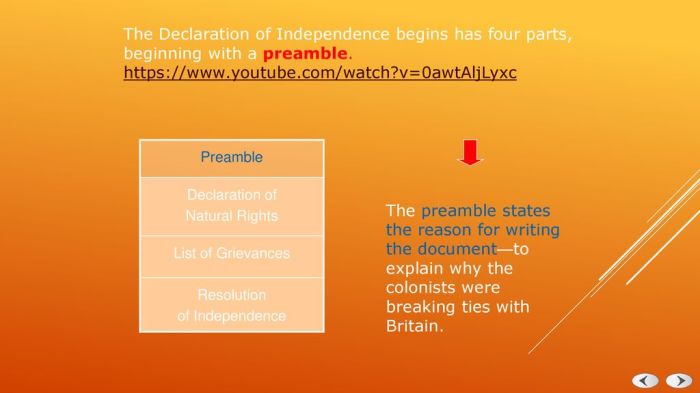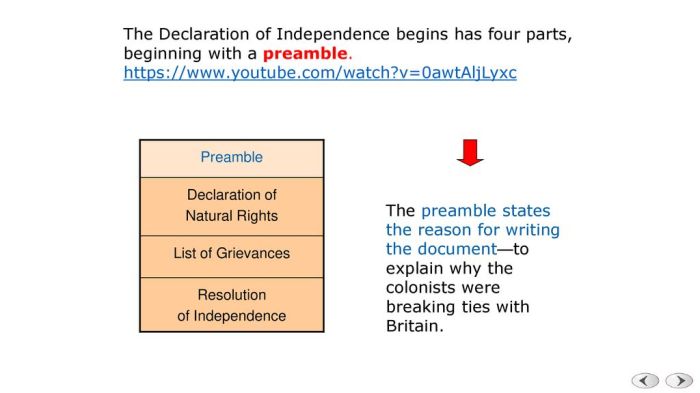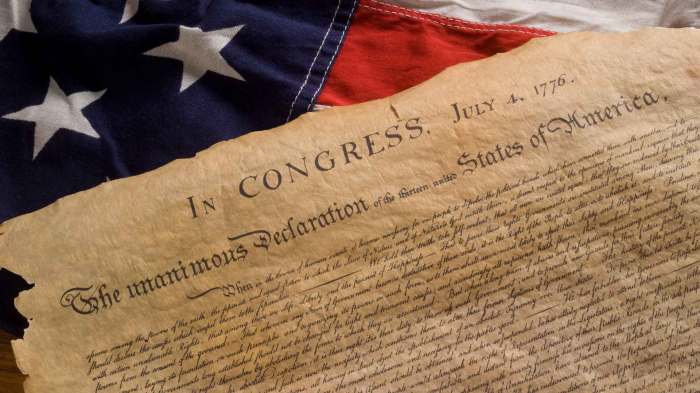Examples of ethos in the declaration of independence – The Declaration of Independence is a powerful and persuasive document that has had a profound impact on American history. One of the key elements that makes the Declaration so effective is its use of ethos, or the appeal to credibility and authority.
The signers of the Declaration were careful to establish their credibility and authority in order to make their case for independence more persuasive. They did this by using a variety of rhetorical devices, including logical arguments, emotional appeals, and appeals to shared values.
Ethos in the Declaration of Independence: Examples Of Ethos In The Declaration Of Independence

Ethos, a persuasive technique that establishes credibility and authority, plays a pivotal role in the Declaration of Independence. The signers employed various strategies to demonstrate their ethos, bolstering the document’s impact and persuasive force.
Examples of Ethos in the Declaration of Independence

The Declaration of Independence contains numerous examples of ethos. The following table presents some notable instances:
| Text | Speaker | Context |
|---|---|---|
| “We hold these truths to be self-evident, that all men are created equal…” | Preamble | Establishes fundamental principles and the Declaration’s moral authority |
| “The history of the present King of Great Britain is a history of repeated injuries and usurpations…” | Thomas Jefferson | Provides specific examples of British tyranny, bolstering the colonists’ claims of oppression |
| “We, therefore, the Representatives of the United States of America…solemnly publish and declare, That these United Colonies are, and of Right ought to be Free and Independent States…” | Preamble | Proclaims the Declaration’s purpose and the signers’ authority to act on behalf of the colonies |
Impact of Ethos on the Declaration’s Success

The effective use of ethos contributed significantly to the Declaration of Independence’s persuasive impact. The signers’ credibility and authority enhanced the document’s credibility, making it more persuasive to both domestic and international audiences. The Declaration’s clear articulation of fundamental principles and the signers’ willingness to pledge their lives, fortunes, and sacred honor demonstrated their unwavering commitment to the cause of independence.
Comparison to Other Historical Documents

The Declaration of Independence’s use of ethos compares favorably to other influential historical documents. For instance, the Gettysburg Address relies heavily on ethos to establish Lincoln’s credibility as a leader and the moral authority of the Union cause. Similarly, the Federalist Papers employ ethos to persuade readers of the wisdom and necessity of the proposed Constitution.
In both cases, the authors’ credibility and the logical arguments they present contribute to the persuasive power of these documents.
- Similarities:
- Use of clear and persuasive language
- Appeal to fundamental principles and values
- Demonstrates the authors’ credibility and authority
- Differences:
- The Declaration of Independence focuses primarily on establishing the colonies’ independence from Great Britain, while the Gettysburg Address and Federalist Papers address broader issues of national unity and governance.
- The Declaration of Independence employs more explicit and declarative language, while the Gettysburg Address and Federalist Papers use more subtle and nuanced persuasive techniques.
FAQ Resource
What is ethos?
Ethos is the appeal to credibility and authority. It is one of the three main rhetorical appeals, along with pathos (the appeal to emotion) and logos (the appeal to logic).
How did the signers of the Declaration of Independence use ethos?
The signers of the Declaration of Independence used a variety of rhetorical devices to establish their credibility and authority, including logical arguments, emotional appeals, and appeals to shared values.
Why was the use of ethos so important to the success of the Declaration of Independence?
The use of ethos was essential to the success of the Declaration of Independence because it helped to establish the credibility and authority of the signers, and it made their case for independence more persuasive.